| Reviews & Columns |
|
Reviews DVD TV on DVD Blu-ray 4K UHD International DVDs In Theaters Reviews by Studio Video Games Features Collector Series DVDs Easter Egg Database Interviews DVD Talk Radio Feature Articles Columns Anime Talk DVD Savant Horror DVDs The M.O.D. Squad Art House HD Talk Silent DVD
|
DVD Talk Forum |
|
|
| Resources |
|
DVD Price Search Customer Service #'s RCE Info Links |
|
Columns
|
|
|
Life On Mars - The Complete Collection (Original UK Series)
THE SHOW:
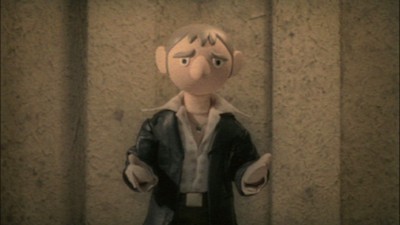
This past fall, ABC attempted to remake the British cop drama Life on Mars for an American audience, transplanting the action from Manchester to New York. They kept the core concept--Detective Sam Tyler, in pursuit of a killer, is hit by a car and wakes up in a fully realized version of 1973; believing that he is imagining this from a coma in the 21st century, he goes along on police investigations to keep the illusion alive while hunting for a way out--but the U.S. production team didn't seem to know how to deal with it. Sam Tyler (as played by Jason O'Mara) was an annoying character. He never accepted or forgot his fate, he never just went along. He was constantly fighting, constantly looking for clues. This didn't make sense to me. At some point, a time traveler would assimilate; somewhere along the way on a homicide investigation, he'd cease to be a man out of time and go with the program. It's just logical. The failure on the part of the U.S. producers to write their Life on Mars this way seemed like either a lack of creative intelligence on their part or a lack of faith in the American audience. "This is 1973," they kept saying, smashing their elbows into our collective ribs, "and don't you ever forget it!"
Fans of the UK original assured me that their beloved Life on Mars was much better, and they told me that the problems I had were not as pronounced in the first run as they were in the remake. A scant 16 episodes, the BBC series got in, introduced the concept, and actually dealt with the story in such a way that each script worked towards the ending--which came before the show grew tired and overburdened with its own set-up. American television, unsurprisingly, was going to keep Sam trapped in the past as long as possible, and even in the first half of its short life (it didn't make it through one season), the writers were piling on red herrings and clues like it was Lost. Again, friends assured me that I could go to the source and watch without fear.
And now that I have seen Life on Mars - The Complete Collection I can say, sure enough, they were right.
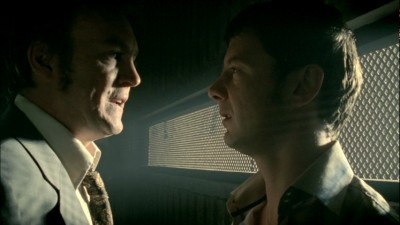
The original Life on Mars was produced in 2006 and 2007, and it starred John Simm (recently seen playing "The Master" in Dr. Who as Sam Tyler). Tyler is a decorated detective on the trail of a killer when a sudden collision with a moving motor vehicle knocks him backwards in time to 1973. Or is he perhaps stuck in a hospital bed in 2006, and this new world is a creation of his mind to keep him alive? This is what Tyler will have to find out...unless this "past life" gets in the way.
Tyler is expected in 1973, you see. He is the new cop in the Manchester precinct, transferring in from another town. He is to serve under Gene Hunt, a.k.a. the Gene Genie. Played with spit and gristle by Cranford's Philip Glenister, Hunt is an old-school police chief. He rules with two fists and a chest full of thunder. Sam has modern notions of how police work is done--by the book, using the latest technology, psychology, and forensic science--and he is not comfortable with Hunt's "cracking skulls" methodology. Each individual episode has, at its core, a police case that needs to be solved, and the path to doing so has Hunt on one side and Sam on the other, arguing over how things should be handled, eventually meeting somewhere in the middle. A reluctant respect and camaraderie forms between the two, and the friendship is actually the best selling point of Life on Mars. Even with all the "why is Sam in the '70s?" malarkey, the powerhouse performance of Philip Glenister and the way he and John Simm spark off each other is the true heart of the program.
While the writers sometimes let Sam's predicament take a back seat to the immediate threat of crime and punishment, the question of what happened to him runs throughout. 2006 occasionally bleeds into his consciousness, usually via a television broadcast or a telephone call. Some cases touch on Sam's memories and the parallels suggest maybe he is getting some opportunities to pull a "do-over" and, by saving a life or changing the course of his personal history, he can escape his sci-fi prison. In one episode, solving a football-related murder reminds him of going to games with his father and allows him to help another young boy cope with losing his old man; in the first season finale, this comes around again, when Sam actually learns the true reason his father left him and his mother without a word, and he spends most of the episode trying to keep his dad in town. In another show, union strife at a textile factory has special meaning for Sam, because he knows that the efforts to rally the labor will fail--in his time, their factory is his apartment building.
The sixth episode is the highlight of the initial cycle and creates maybe the most direct situation where Sam is put into the crosshairs of fate. An old man takes a newspaper staff hostage, threatening to kill someone at 2 p.m. That same morning, Sam gets a future phone call from his mother where she is apologizing that she is going to pull the plug on his life support. The plan is to shut down the machines at 2 p.m., and so Sam is convinced if he can stop the killing in 1973, he can save himself in 2006. In dealing with the hostage taker, he is also able to give more power to the female cop he has made friends with, Annie Cartwright (Liz White, The Fixer). Throughout the show, Sam empowers Annie, helping her fight against the chauvinistic old boy's club. Annie is his sole confidant, though she thinks he's a little off his rocker. It's a more believable character detail than actually having her accept he comes from 30 years in the future. She goes a long way to keeping Sam on track, forcing him to face the reality of his current here-and-now when his instinct is to charge through things of his own accord. Naturally, romantic tensions develop there, as well.
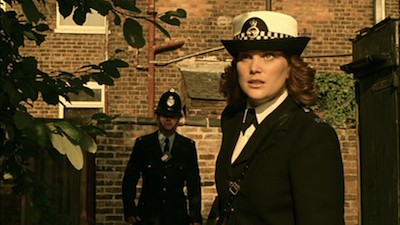
Season Two starts out a little rocky. Flush with initial success, the producers start to ramp up the show to be bigger and better--though not always the latter. In the season's lead episode, Sam confronts the younger version of a bad guy that he was after in 2006, and as it turns out, that same bad guy is at his bedside in the hospital in the 21st Century slowly torturing him to death, the effects of said torture manifesting on Sam in his new world. While it does give Sam the opportunity to save a woman whom he knows he has failed to protect down the line, this direct interaction through time struck me as overdoing what need not be escalated. Also, a final act twist suggests there is something deeper to Sam's role in Gene Hunt's precinct than he previously knew.
That, however, is rightfully set aside as the show gets back on course over the next several episodes. Life on Mars hits a real peak in the middle of season 2. Episodes 5 and 6 (here, DVD 3) are possibly the show's two best hours. In 2.5, the new back and forth between the future and the past means that a mix-up with comatose Sam's pain medication takes him out of the action. Much of the show is told through flashback and reconstruction, and the final act has Sam sidelined, watching on a television set as his teammates blossom without him by taking his advice on board. Episode 2.6 takes another case where Hunt and Sam butt heads--this time over racial sensitivity--but also adds the final component to Sam's connection to this past. It hadn't occurred to me until this episode just why Sam went back in time, be it a real leap through the decades or an imagined one. He was drawn to 1973 because that was the year where his life took shape, even though he wouldn't have known it at the time. His temporal shift allows him to arrange all the pieces: seeing his father running away, altering a crime boss' trajectory, meeting the mother of his girlfriend. These are important pieces of his history, and rather than seeing his actual life flash before his eyes the way it so often does in a near-death experience, he gets to see the building blocks of that life.
1973 is like a living character in Life on Mars. Not only is the historical difference an endless source of conflict--and don't make the mistake of thinking the producers are saying our progression from the two-fisted, hard-drinking world of Gene Hunt is all it's cracked up to be--but it's a great excuse for putting the actors in slick clothes and gathering up good music for the soundtrack. T. Rex, Slade, Gilbert O'Sullivan, Roxy Music, Sweet, Elton John, the Upsetters, tons of David Bowie--it's hard to believe a television show could afford so many great cuts. The production staff gets it exactly right, and not in a way that seems like a gimmick or an ironic ploy. Life on Mars feels real--an essential component of us buying into whatever is happening to Sam.
And what is happening to Sam? Be warned, after this photo, I will be writing about the ending. I won't give the whole game away, but Spoilers, Ahoy!
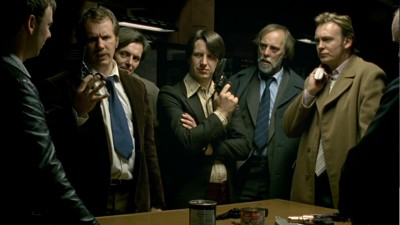
The new plot wrinkle that emerged at the end of episode 2.1 comes back around for the last two installments of the series. In the penultimate segment, Sam discovers that he has been sent to Manchester to bring down Gene Hunt--something Gene, of course, very nearly does himself. The messages through the TV and radio are that a tumor has been discovered in Sam's brain, and to allow his doctors to get rid of the cancer for real, he is going to have to bolster all of his strength to get rid of the metaphorical cancer that the Gene Genie represents. In other words, while surgeons work at healing him, he must heal the world in which he has exiled himself. He must destroy his own construct.
Except it's not so easy. There were a million obvious ways out of this show, and the writers of Life on Mars decide that rather than take them, they'd like to challenge their audience one last time. In the finale, evidence is presented to Sam that makes him doubt whether he has bought into the right delusion. Maybe he's not from the future at all, maybe that car accident really happened in 1973 and it's messed with his brain. In one scene, everything we've come to believe about Life on Mars is removed, and the last episode goes from being about how Sam is going to get home to what exactly "home" means. John Simm gives a truly knock-out performance. Sam loses his whole being, and he is saddled with the same massive doubts that so intrigue us as viewers. The guy looks like he's being dragged through the wringer. The fear and tension runs thick, and the audience is kept guessing right to the end.
I'll admit, I had doubts that Life on Mars was going to deliver. Shows with complicated, bizarre mysteries like this one far too often get hung up on their own weirdness. The architects design a structure that can't possibly hold. Hell, it's what happened when the show got remade for the U.S., and those guys had someone else's blueprint to follow. Thankfully, no one needs to bother with the knock-off, we've still got the original Life on Mars, and it gets the finish just right, making it sixteen hours of television worthy of the time you invest in it.
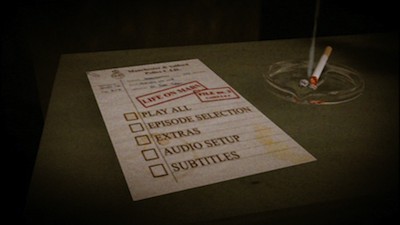
THE DVD
Video:
Both seasons of Life on Mars have been on DVD before, and The Complete Collection is simply a bundling of the two season sets in one box. (The packaging is literally the same for the individual keepcases.) You can also check out the previous reviews by John Sinnott. Season 1 is here, and Season 2 here; plus, John reviews the DVD of the complete U.S. series.
All of the shows are in 1.78:1 widescreen and have a fairly solid presentation. There are some faults to be found--the colors are a little off, there is some minor problems with resolution--but overall this is a fairly good presentation of a recent television program.
Each season is 4 discs, with 2 episodes per disc.
Sound:
Both sets have an option of a stereo mix and a 5.1 mix to choose from, as well as English subtitles for anyone who wants to back up and get some help deciphering the thick accents. The soundtracks are good, with some decent effects and a focus on the dialogue.
Extras:
Each season has its own collection of extras. The first one has the most, with audio commentaries by cast and crew on every episode of the season. In addition, there are also multiple video featurettes spread across the four DVDs:
* "Take a Look at the Lawman" documentary (64 minutes)
* Interview with Bharat Nalluri (3 mins.) the director of the first two episodes
* "The Music of Life on Mars" (14 mins.) featuring composer Ed Butt
* "Get Sykes" (8 mins.) with production designer Brian Sykes
* Outtakes reel (6 mins.)
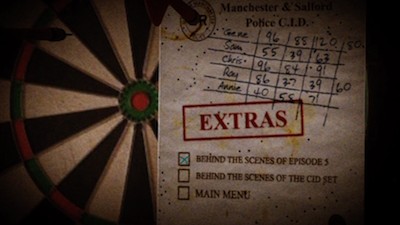
Season 2 drops the commentaries, but there are several video features:
* "The Return of Life on Mars" documentary (45 minutes), an exclusive look at the second season *
Episode-specific behind-the-scenes bits and a tour of the set (48 mins. total) *
"The End of Life on Mars" (28 mins.), a farewell to the show.
These are all the same extras as on the earlier releases.
FINAL THOUGHTS:
Highly Recommended. Life on Mars - The Complete Collection (Original UK Series) bundles together the two earlier season sets and gives fans of complex, off-kilter dramas the best way to get their hands on this excellent television program. Essentially, this is a cop show with a twist--a police detective in 2006 is knocked backward in time to 1973, where he is a member of a police force whose hard ways are far different than what he knows. If he can figure out what he is doing there, he can hopefully find his way back to his own time--if indeed that is what happened to him. Perhaps he's really just crazy, you know? The good writing is bolstered by unforgettable performances from John Simm and Philip Glenister, making Life on Mars an all-around winner.
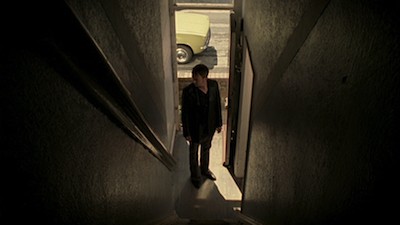
Jamie S. Rich is a novelist and comic book writer. He is best known for his collaborations with Joelle Jones, including the hardboiled crime comic book You Have Killed Me, the challenging romance 12 Reasons Why I Love Her, and the 2007 prose novel Have You Seen the Horizon Lately?, for which Jones did the cover. All three were published by Oni Press. His most recent projects include the futuristic romance A Boy and a Girl with Natalie Nourigat; Archer Coe and the Thousand Natural Shocks, a loopy crime tale drawn by Dan Christensen; and the horror miniseries Madame Frankenstein, a collaboration with Megan Levens. Follow Rich's blog at Confessions123.com.
|
| Popular Reviews |
| Sponsored Links |
|
|
| Sponsored Links |
|
|
| Release List | Reviews | Shop | Newsletter | Forum | DVD Giveaways | Blu-Ray | Advertise |
|
Copyright 2024 DVDTalk.com All Rights Reserved. Legal Info, Privacy Policy, Terms of Use,
Manage Preferences,
Your Privacy Choices | |||||||












